#but wrath is illogical because Vulcans ‘don’t have emotions’
Text
SNW Liveblog: “Under the Cloak of War”
another installment of Grimdark Trek in which SNW tries its hand at “Conscience of the King” without understanding that episode’s ethics.
or: The Wrath of M’Benga

A fantastic look for her! (Finally.)
Ortegas sucks, is judgy/borderline racist, and insubordinate. What else is new?
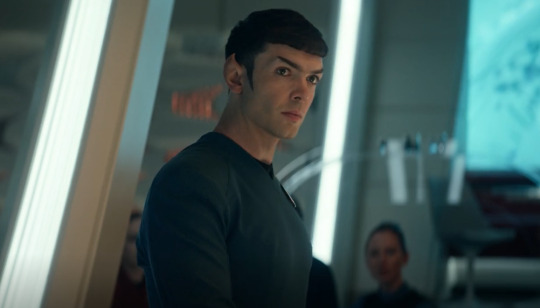
The choice to put war in Christine and M’Benga’s backstory still makes very little sense to me. I know Christine was underdeveloped in TOS, but this background has nothing to do with that character.
“Chris needs us [at dinner].” Why, though? They both clearly have pretty bad cases of PTSD (M’Benga almost had an actual heart attack in the previous scene), whereas Pike does not. So why does he need them there, for (lack of) moral support? Christine’s dating a Vulcan—maybe she should call M’Benga out for being illogical.
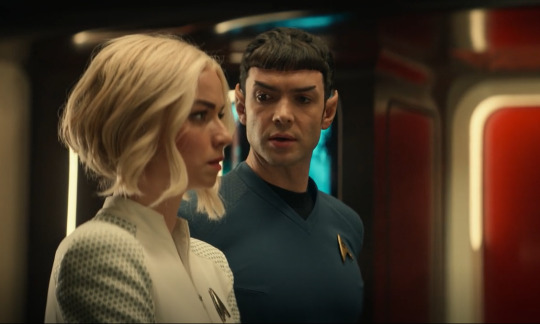
Protective boyfriend Spock!
“Our captain needs us.” This again? He needs them for what? And as CMO, M’Benga should be well aware that neither he nor Christine are medically fit to represent Pike, the Enterprise, or the Federation at large in their current emotional states.
NOT the Superpower Serum subplot coming back. It was stupid in 2x01, it’s stupid now.
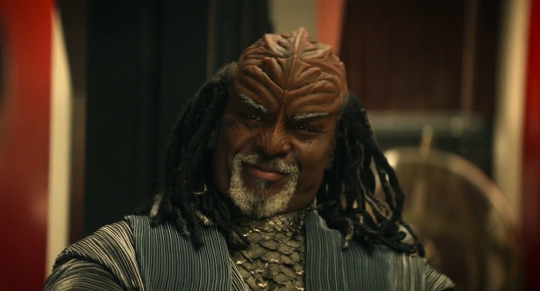
Why do Klingon prosthetics/makeup look worse now than they did in the 80s? His scalp looks like it’s made out of plastic. (Which maybe it is. But that's the problem.)
Christine’s often emotionally unavailable partner is attempting to be warm/supportive/empathetic in his own way, and she’s pushing him away. I do understand that SNW!Christine is traumatized and suffering from PTSD, which may cause her to behave in ways others see as irrational…but she was able to cope with the horrific events of “All Those Who Wander” and to offer emotional support to Spock afterwards despite the likelihood that those events were probably upsetting/triggering. So her behavior here makes no sense to me. Maybe the writers hadn’t thought up this backstory for her back in Season One…
“War changes people.” But this episode isn’t going to explore whether it actually changed Rah, is it? Or whether he is/can be/should be redeemed?
“How can we represent a Federation that believes in peace if we say some people aren’t allowed to make up for their past?” Wow, the writers are actually allowing Pike to be articulate AND correct? Granted that he’s been a total insensitive dumbass so far, but I’m still impressed.
“And when you find whoever’s in charge, you make them pay.” Jess Bush is a very talented actress. So it’s a real shame that this is the material she’s been given. Trek is about people overcoming things like the desire for vengeance and being better humans—about choosing to be better, in fact! Yet this nurse is advocating vigilante justice?
“Don’t let hate ruin your soul.” These are some fundamental Trek ideas! But they're coming from the “bad guy,” so I guess the writers ARE saying that “some people aren’t allowed to make up for their past”...
M’Benga violently murdering someone in flashback...yikes??
I saw a comment about how disturbing it is that SNW keeps making its two medical characters special-op types, and it’s true. McCoy might have had faults, but he honored his oath to the letter. First, do no harm. He was an empath, arguably the conscience of the show—not for nothing do fans very often portray him as the symbolic “heart”/pathos of the TOS triumvirate! Pain, suffering, and death physically sickened him. He could never have fatally stabbed someone, in a rage or otherwise. Justified or not. That’s the kind of doctor I want on my peaceful intragalactic exploratory mission. Didn’t the Rukiya subplot and its highly questionable resolution make M’Benga morally ambiguous enough???

…well, that answers that question.
There are definitely cameras on the Enterprise. Probably even in Sickbay. We know this because of common sense and because they pulled the “tape” when prosecuting Kirk in “Court Martial” and then again when Sarek confronts Kirk in Search for Spock! Christine could NOT cover up the truth here. (And while I’ve seen some people argue that the truth is ambiguous, I strenuously disagree. M’Benga murdered Rah.) Nor should she. Though she’s a traumatized war survivor like M’Benga, and Rah is a criminal from the same war, the CMO of the Federation’s flagship stabbing a (probably-unarmed) diplomat in a time of peace AND while on duty is a most definitely court martial offense. To put it mildly! Even if M’Benga was driven by his severe PTSD to react violently when Rah confronted him, he should be relieved of his duties, placed on medical leave, and treated. He should NOT continue serving on the Enterprise. This is even more severe and alarming than his rash decision regarding his daughter in Season One, and it should be the end of his Starfleet career. WHY did they write this?!!?!
Not only does no one properly investigate, Pike kind of shrugs and side-eyes M’Benga slightly before closing the case. A diplomat was killed on his ship under suspicious circumstances while alone with two people that Pike knew were struggling emotionally as a result of said diplomat’s presence… and he just takes their word for what happened and moves on?!
tl;dr They’ve ruined M’Benga. Twice. The Rukiya subplot was pretty bad, but at least his ultimate goal was for his daughter to live. This is also bad, but it makes M’Benga—a DOCTOR—a cold-blooded killer (both in war and in peacetime) in a universe that has always stood against violence and vengeance and for dialogue and reconciliation. It’s still a “war is hell, peace is the way” message, but it’s weakened by the choices made by its characters. War is bad because it irrevocably traumatizes and destroys people. Healing doesn’t exist, not even in the utopian twenty-third century with all its advanced medicine. What kind of message is that?
Thanks, I hate it.
The Good: Babs Olusanmokun and Jess Bush both give amazing performances (better than the script/character arcs deserve by far), and Robert Wisdom was also great as Rah—Spock being a supportive boyfriend! ♥—a nice allusion to TNG: Spock mentions Sun Tzu’s “The Art of War” (quoted by Riker in TNG S1)
The Bad: wildly out-of-character/unethical behavior and violence that contradicts and undermines the whole spirit of Star Trek!!! Babs’ excellent acting is undercut by an abysmal story (again)—an unnecessary war backstory for Christine so that she, too, can be Traumatized™—pointlessly sabotaging Christine and Spock’s relationship after just two three episodes* for, idk, drama?—bad Klingon makeup/prosthetics—Ortegas is a terrible officer—Pike is a terrible captain—no exploration of whether Rah was actually a changed man
I won’t comment on the war flashback scenes except to say that I don’t think they needed to be as gory or as drawn-out as they were to be effective. That’s on-brand for SNW, though.
Season 2 Pike is a completely ineffective leader who appears to command very little respect and even less authority. He really is the Sitcom Dad of captains—well-meaning, oblivious, and kind of bumbling.
Finally: I’m really confused about what motivated the writers/showrunners to pursue the Spock/Christine storyline for, what, 16-17 episodes only to now have Christine be reluctant to even call their relationship…well, a relationship. She also seems to be the one undermining said relationship. Just to refresh: in TOS, Christine was the one who admitted to being in love with Spock; who signed aboard the Enterprise out of loyalty to her missing fiance (!); who loved Spock so much that she let his consciousness be placed in hers in order to save his life. And in THIS VERY SHOW, Christine stole a shuttlecraft and engaged in interdimensional travel in order to beg some aliens to repair Spock’s broken genome!
Not only do I support Trek’s decades-long promotion of peace 110%, I also support SNW’s (apparent) goal of fleshing out the underdeveloped female characters from TOS. That said, there was no good reason to put full-blown war in Christine Chapel’s backstory! Girl was studying to be a bio-researcher and dating a professor before she became a nurse, not serving as a combat medic! If the creators wanted this show to feature original characters in the Trek universe, they could have done that—just like every other (pre-Discovery) Trek has done before them. But what they actually wanted was to use familiar names to get more views/higher ratings. So those names got assigned to characters who are still, essentially, OCs. It is endlessly frustrating to me.
But still not as frustrating as what they’ve done to M’Benga. The writers of this episode really need to watch “Conscience of the King” again. On a loop.
*I skipped 2x07 because Lower Decks is not my thing, but I know the S/C sabotage actually begins in that one. :|
EDIT: After thinking about it more and sleeping on it, I think that even if it WAS ambiguous and Rah killed himself or it was somehow self defense, M'Benga and Chapel have a moral obligation to attempt to save the life of a man with a giant knife sticking out of his chest. Instead, they both stare at him as he dies on the floor. Reprehensible behavior either way.
#this one is ranty and negative and i'm sorry :\#sometimes my liveblogs are just nitpicky. this one is kind of angry.#disgusted might be a better word tbh? dismayed?#luth liveblogs snw
3 notes
·
View notes
Text
Officially ignoring canon, thinking about Vulcans being excited to meet humanity and rushing to make contact when they finally meet the requirements for First Contact, then convincing them to join their federation, and keeping an eye on their scary looking ships because humans do things in kind of a scary way and why can’t you all just stay safe, your lifespans are short enough!!
#Star Trek#in my head they love humans but the higher ups have to seem like they hate them#because it’s illogical to like creatures that are so illogical#but how fucking dare those other assholes try to hurt humans you’re about to face the full amount of vulcan wrath#but wrath is illogical because Vulcans ‘don’t have emotions’#(they do)#(they’re about to fuck you up for messing with humans)#I’m so sorry this is so self indulgent and out of character but I am so tired that filter is gone#I will feel embarrassment in the morning#humans#Vulcans
29 notes
·
View notes
Text
Vulcan Philosophy: VHC vs Syrranite vs “V’tosh Ka’tur”
This is basically my take on the Vulcan philosophical-political spectrum and I reallllllly wanted to talk about it!
In Star Trek ENT we see two named sects that opposed the Vulcan High Command before Surak’s writings “Kir’Shara” were rediscovered.
The Syrranites (lead by Syrran and later T’Pau) the pacifist anti-espionage movement, who wanted an end to the war with Andoria, and not not withhold secrets from Humanity. They weren’t as xenophobic as the then-current government (but still pretty xenophobic, they just didn’t actively hate/enact violence on other races) that ultimately took over by the end of the events in ENT.
The V’tosh Ka’tur (the fragment of this group we see in ENT episodes Fusion & Stigma is lead by Tolaris) their title is a derogatory moniker that translates to “Vulcans without logic” who disagree with the ancient teachings. Believing Surak had intended the meaning of control to have been “to master” not “to suppress” that logic is an essential part of Vulcan existence, but that there must be balance and not exclusion. That balance can be reached by careful discipline and meditation.
The Syrranites took over the majority of Vulcan politics, and suppression is the way to go and the V’tosh Ka’tur (as they are known in Enterprise, by name at least) disappear. V’tosh Ka’tur is still used derogatorally, Sybok is considered one, and Spock is accused of it a few times. However I wish there was another name for the Vulcans of that philosophy we saw in ENT.
Because I really don’t think that philosophy just died out.
I think it got absorbed into the Syrranite movement because their goal, while the means were different, is still emotional control as is rooted in Surak’s teachings. One who masters their emotions through discipline and meditation, and chooses not to express those emotions, cannot be disintinguished from a Vulcan who withholds their emotions by suppression.
I think the movement that got labeled as hedonistic “V’tosh Ka’tur” just got quieter and subtler and spread through teaching methodology rather than political rhetoric!
In the Voyager episode Random Thoughts Tuvok says “all members of the Vulcan race learn to inhibit emotions” the author of the Memory Alpha article took this to mean that the “V’tosh Ka’tur” movement/philosophy is dead, but I don’t think so!
Philosophies, like languages, don’t die, unless they’re murdered, they evolve and change yes, but they don’t just die. The Syrranites, though still very conservative in many respects, are intrinsically non-violent. Every Vulcan we see who builds themselves on emotional suppression alone has issues (Sarek for example! His repression drove him insane, it’s also illogical to mentally abuse your kids so there’s that) but Tuvok doesn’t.
Inhibit means “to hinder, restrain or prevent” you can stop something by acknowledging that you will instinctually feel something, and then dismissing it OR you can inhibit yourself by forcing yourself not to feel it and pretending it was never there in the first place. Verbal ambiguity is a huge thing!
I firmly believe that Tuvok (and other Vulcans who aren’t supremely xenophobic, are low-key wrathful and vindictive, or otherwise unhinged) follow the philosophy that we see in Enterprise in spirit if not in name, while the majority of Vulcans use the traditional suppression/Syrranite method!
I think, while it’s not a precise comparison to human politics (and the way Surak is regarded it’s more similar to religion than anything). Vulcan High Command was on the equivalent of our political right, the “V’tosh Ka’Tur” are the political left, and the Syrranites are in the middle. Then there’s still the whole random element of the translations of Surak’s teachings still being incomplete, and who would listen to which aspects should more of his lessons be revealed!
Bottom line: Vulcan politics are cool and I think Tuvok (and other “chill” Vulcans) is somewhere between a Syrranite movement and the “V’tosh Ka’tur” while the rest of Vulcan is closer to pure Syrranite while extremists lean toward Sybok’s cultish attitudes or old VHC government philosophy (which would explain the bombing Michael almost died from)
#star trek#vulcan#vulcans#star trek enterprise#Ent#enterprise#Star Trek tos#tos#Star Trek discovery#discovery#disco#vulcan politics#vulcan philosophy#t’pau#syrran#surak#Tolaris#tuvok#sarek#Spock#t’pol#vulcan high command#worldbuilding#Syrranite#V’tosh Ka’tur#michael burnham#Kir’Shara
54 notes
·
View notes
Note
I just watched Wrath of Khan twice in a row (for an online class) and thought, hey, you know what, I bet you have lots of feels about That Scene in the reactor chamber and would love to share the angst.
Oh my goodness firstly I am so sorry I haven't answered your other ask yet!! I am working on it this last book is just proving...less than satisfactory 😅
But yes I have SO many thoughts--I just haven't seen the whole movie yet 😂 I am trying my best to go chronologically and avoid spoilers but that scene has already been spoiled so it's definitely something I'm familiar with, I just don't have the context of the first two movies to really back it up, ya know?
That said, hoo boy is it a doozy. I have to say my favorite part is...well, I can't pick one, but some of my favorite parts:
Spock immediately jumping to "did it work?", desperate to justify his sacrifice, but also knowing Jim's world is ending and gently telling him, "Do not grieve"...
Really just how Spock focuses on Jim's emotions for the whole scene. He makes a joke (just like Jim does in these situations), he explains why he had to do what he did, he reminds Jim that the crew is safe--and then he finally admits the depth of his love and care for Jim. Spock needed him to know how much he mattered.
Quick aside I also love how as he rises he adjusts his jacket. This is actually because Nimoy did this reflexively as the outfit tended to ride up on all of them, but it is so in-character that Spock would want to be dignified in his death, not just for himself, but for Jim's sake too.
The Vulcan salute on the window??? How JIM SO GENTLY MOVES TO TOUCH IT IN REPLY BUT "I COULDN'T TOUCH HIM...WE WERE SEPARATE" AUGHHHH...how Spock is reaching out at his last moments but the comfort he's always wanted is just out of reach???? Curse you, Shatner, for the brilliant idea of having them be separated by a thin pane of glass "to represent the walls that Spock has always put up" that might be see-through but still keep people, even Jim, at a distance, however small...curse you
The eye contact,,, Spock locks eyes with Jim for basically the whole scene, which is something he almost never does in vulnerable moments, but he does it now because it's a lifeline--he needs to connect with Jim any way he can, he needs that support--and also because that's what Spock does when he is deeply concerned about someone (like how he looks at Bones in the Empath, or how he looks at Jim in the hallway when he grabs his arm (TOS)) and basically Spock is trying desperately to make sure Jim is going to be ok
How Spock says "Live long and prosper" which is both a customary farewell, which by the way Jim has only heard many years ago on Vulcan when he saved Spock's life, so it's another small way to speak to the bond between them because Jim knows what it means when someone else wouldn't have understood the cultural and personal significance of the phrase, and is ALSO Spock not-at-all-subtly telling Jim, "You are not going to give up. You are going to live many more years, and you are going to lead a good life, and you are going to thrive, because this will not break you. Your ship is safe. Your crew is safe. I cannot protect you from this, but you must protect yourself. You do not end here." And if it isn't the most Spock-like thing ever to express so much through so little...and he says it so bravely, so firmly, almost like he's defying death...
And ALSO. THIS MAN. DISCREETLY HINTED THAT HE WASN'T TRULY GONE. He couldn't know whether it would work for sure, he only had a hope, but Spock was going to pass that hope on if he could. He says, "I have been, and always shall be, your friend." Always shall be. Firstly let me say I love how he never forgot about Edith Keeler and is referencing what she said about where he belongs--which of course Jim was also there for, and that is also a deeply personal memory for him which references again how close they are--and secondly, he's making ANOTHER reference to their past because Spock has told Jim before that he feels friendship for him, but that he's ashamed by that (S1E4), and now in his final moments he's admitting what he could never admit before, what caused him such pain after the mission ended and when he returned and saw his t'hy'la again, and he's finally saying it proudly and he is not ashamed. But I fully believe Spock also meant that phrase to speak of the future, however imprecise and illogical it might be. How was he to know that they would find each other again, and again, even across universes? But the truth is the truth.
Speaking of, when Spock Prime finds Jim on the ice planet in 2009? What does he say? Well first he RECOGNIZES HIM, and the way he says his name with such familiar warmth, because--of course it's Jim. Who else would it be? And he says, "How did you find me?" because Spock had just lost his planet and he was anguished and alone and so it is the most obvious thing in the world--in the universe--that somehow, despite all that logic might say, Jim is looking for him. Of course Spock believed Jim came to find him. He did before, and death never stopped him then. Why should it now?
But then when Jim is confused, before even saying his name, Spock says, "I have been, and always shall be, your friend." This is how they know each other. It isn't the first time he's repeated it to Jim to express how lasting their bond is. But it is the deepest expression of what they share. And starting immediately and lasting for the rest of the movie, despite initially knowing nothing about Jim--even expressing surprise that he isn't the captain--Spock calls him only Jim. We never once hear "Captain" or anything of the sort, even before he knew it wasn't an accurate title. Spock speaks to Jim, especially during the mind meld, as though he's known him for ages.
Because he has.
He always has.
And it's good to see him again.
#and i have many many many more thoughts about the other snippets i've seen from the movies#but let me tell you when i get my hands on those movies (and the novelizations of which i own four) the content you will see#the sheer amount of it. the stream. will be unbelievable#star trek#spock#jim kirk#star trek ii#star trek ii: the wrath of khan#my meta posts#kay can i just catch my breath for a second#responses aka the ramblings of my brain#also aslanscompass thank you so much for sending me asks!! it's always such a delight to see + to hear from you! thank you :)#star trek aos#my ultimate favorite posts#had to do it bro i'm sorry this is what i love most about them#they find each other in EVERY LIFETIME THEY ARE ALWAYS TOGETHER AND ALWAYS HAVE BEEN AUGHHH#right in the feels#augh the pain
23 notes
·
View notes
Text
The illogic of a logical philosophy
The pilot episode of Star Trek: Discovery was titled “The Vulcan Hello,” and Michael Burnham was all about giving one to the Klingons.

Unfortunately, the Vulcan hello she was referring to looked a little less like this:
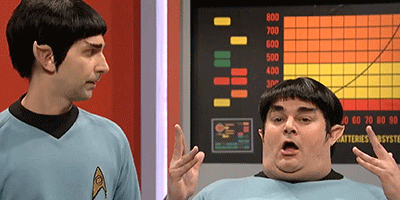
And a lot more like this:

Apparently, this shocked some fans, but I’m not really sure why. There are a lot of perpetuated ideas that Vulcans are strict pacifists because, after all, war is illogical. But if we really peel back some of the canon, the reality is that Vulcans probably prefer peace, but they’re certainly not above violence, and that’s the problem with living by logic.
Is violence illogical? Who’s to say? Even a philosophy based on pure logic is doomed to be convoluted because spoken language is imprecise and no philosophy is absolute. Yet Vulcan philosophy is often treated as though it must be, as if for any single issue, there is only one perfectly logical solution amid a sea of half-logical alternatives and utter irrationality.
So, what is Vulcan philosophy? Over the years, it’s expanded into a belief system that has two giant scoops of Greek stoicism, a pinch of Jewish mysticism, a dollop of utilitarianism, and a rationalism cherry on top. I would actually argue that this Frankenstein philosophy is whatever it needs to be, so long as it can be defended with a reasonably sound argument delivered in monotone, dispassionate speech. And therein lies the problem. How do we decide what is “reasonably sound?” Worse yet, what is logic?
Believe it or not, there is no universal agreement on the exact scope of this particular discipline. The ancient Greeks studied logic in philosophy, but logic also has more discrete applications in mathematics, computer science, and linguistics. I could type thousands of words dissecting the different branches of logic, but Wikipedia did it so much better than I ever could. Bottom line is, if you’re not using logic to defend mathematical proofs or write code, there’s a whole lot of gray area for what can be considered “logical.”
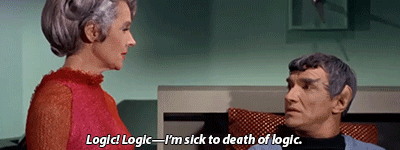
Me too, Amanda, me too.
So how do stoicism, rationalism, and utilitarianism fit into the Vulcan narrative? Stoicism goes back to the ancient Greeks and championed the idea virtue was based on knowledge, and that wise and virtuous people lived in harmony with reason and were able to accept reality and not allow themselves to be controlled by pain, fear, or desire. If that doesn’t sound like the first page of the Vulcan playbook, I don’t know what does.
Rationalism is a philosophy that sort of bridges ancient stoicism with the modern world and asserts that reason should be the chief source and test of logic rather than religious belief or emotional response. And lastly, utilitarianism is a doctrine that asserts that actions are right if they are useful or benefit a majority. Sound familiar?
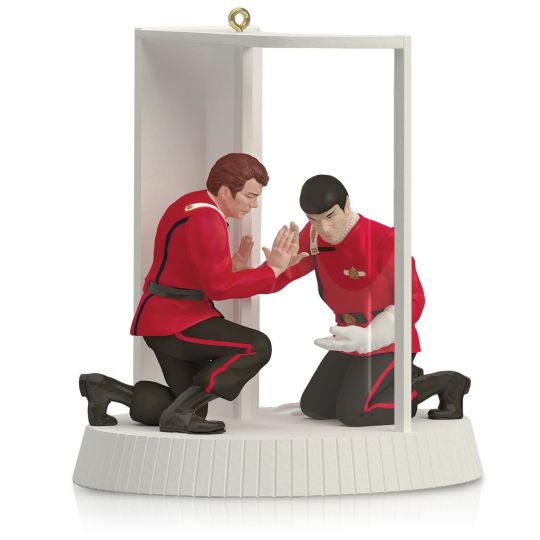
If it doesn’t, you’ve never seen The Wrath of Khan. Or shopped at Hallmark.
But the thing is, not one of those philosophical systems says, “No violence.” If The Teachings of Surak has strict rules prohibiting violence, all the Vulcans we’ve ever met across six different series are really shitty Vulcans.
We see many instances of Vulcans preferring to avoid violence and killing—Vulcans often employ a nerve pinch to subdue aggressors rather than smack them around—but they are capable of worse. In the TOS episode, “Journey to Babel,” a Tellarite ambassador is murdered by someone who “knew exactly where to apply pressure to snap the neck instantly,” according to Dr. McCoy. As Kirk ponders who could have possibly committed such an act, Spock is all too quick to throw his dad under the bus and say, “Vulcans.”
While he quickly adds that “Vulcans do not approve of violence” he also mentions that “it would be illogical to kill without reason.” And so:

Backpedaling at warp eight.
Sarek knows how to kill because he’s skilled in a deadly martial arts technique called tal-shaya. The fact that Vulcans train in martial arts, possess weapons like the lirpa and the ahn-woon, and cruise around the quadrant in ships outfitted with weapons suggests they are at least prepared to defend themselves if necessary, which would disqualify them from being absolute pacifists. But that doesn’t necessarily make them warmongers either.
So, what about actually instigating a war? In Enterprise, we got a view of Vulcans that a lot of people weren’t comfortable with. We saw Vulcans spying on their Andorian neighbors, we saw religious factions fighting one another, and we saw a Vulcan High Command that seemed remarkably belligerent. Some fans might argue that after the discovery of the Kir’Shara in the Enterprise story arc that included the episodes “The Forge,” “The Awakening,” and “Kir’Shara” led to a new reformation, Vulcans returned to their true logical roots, ditching their semi-violent ways.
But it’s evident that Vulcans believe that sometimes logic requires violence. Recall those utilitarian principles woven throughout Vulcan philosophy. One of the most well-known philosophical thought experiments is referred to as The Trolley Problem, and it’s a test of utilitarian judgments. There are many variations, but the short one goes like this:
There’s a trolley hurtling down a track with five people on it. The brakes are shot and it’s going to crash, killing all on board. You happen to be standing next to a switch that would divert the trolley onto a separate track where it would gently crash into a sandbank, saving the lives of those five people. The only problem is, there is a person tied to the tracks you want to divert the trolley onto. If you pull the switch, you will actively kill one person to save five. If you do nothing, you will passively allow the person tied to the tracks to live at the expense of the five on the trolley. And so, if we are capable of acting, do we have a duty to act? (Here’s a fascinating quiz if you’d like to explore your own beliefs on the subject.) But what would Vulcans do?
Rather than spend time debating it, I can tell you exactly what most Vulcans would probably do. In the TOS episode, “Operation, Annihilate!,” Deneva colony is infested with neural parasites and Dr. McCoy can’t find a way to kill them. Kirk is struggling to find a way to prevent the spread of these parasites, and Spock points out the only logical solution, though it is “understandably upsetting,” is to destroy the colony and its one million inhabitants because there are billions of people living beyond Deneva colony to think about. McCoy didn’t handle it well.
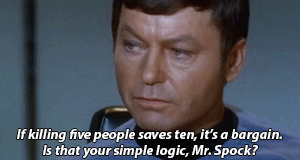
A real dick move, Mr. Spock. A real dick move.
Now, to his credit, Spock was also infected, so he was willing to die for his principles, but he didn’t bat an eye at the idea of killing a million people. The good news is, it’s old-school Trek so of course they found a solution that didn’t end with the tragic slaughter of a million colonists, but Spock’s initial recommendation was that it was logical to commit an act of violence against one million people to save the lives of billions.
Maybe you agree with him, maybe you don’t, but that being said, is it really such a wild notion to believe that the Vulcans would prefer occasional small acts of aggression against the Klingons if there were sufficient reason to believe it would prevent a war?
When explaining to Captain Georgiou what a Vulcan hello was, Michael Burnham didn’t say the Vulcans slaughtered every Klingon they encountered, simply that they “fired first” in order to “say hello in a language the Klingons understood.” If anything, it sounds like the Vulcan policy was more in line with a warning shot than a Klingon genocide, and from my own simple-minded human perspective, that sounds pretty damn logical if it prevents real and prolific bloodshed.
But that comes back to the initial question of “what is Vulcan philosophy?” Perhaps we should ask ourselves who is the ultimate judge of what is logical? In theory, it should be Surak and his teachings, right?
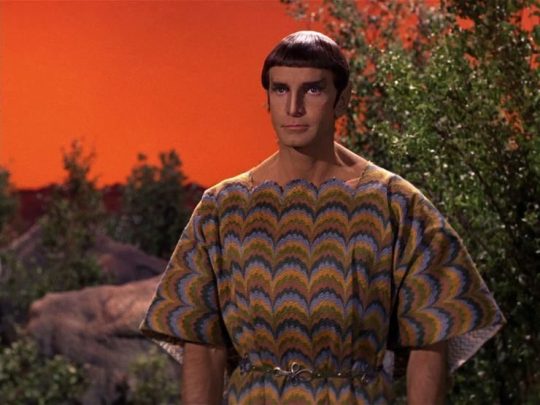
Surak’s a smart guy who obviously knows a bargain when he sees one, as illustrated by this ensemble that looks a 6th grade home economics project met the clearance rack at the local craft store.
Unfortunately, just because something is written down doesn’t mean everyone is going to agree on the same interpretation, otherwise, the U.S. Supreme Court would be about 99% less busy and history wouldn’t be littered with the bodies of billions of people desperate to prove their version of the God of Abraham is the right one.
I don’t know why Vulcans are so often portrayed as being a culture of homogenous personalities, beliefs, and values, as though logic is logic and there’s no room for variation. Imagine what the series would have been like if we played switcheroo with Spock, Tuvok, and T’Pol. Picture the moody and somewhat emotional T’Pol trying to give advice to Captain Kirk, or the wise and experienced Tuvok trying to talk Archer out of half the shit he did in the Delphic Expanse.

Tuvok’s eyes are clearly asking if it’s too late to go back to the Delta quadrant and get assimilated by the Borg.
The point is, individual Vulcans aren’t interchangeable, and I don’t think their beliefs are either. Just look at what happened in the Enterprise episode, “Carbon Creek.” Three Vulcans are marooned on Earth in the 1950s and are facing starvation when they encounter a pair of deer. Despite the fact that Vulcans eat plant-based diets because their tenets about non-violence extend to animals, Mestral suggests eating one of them because:
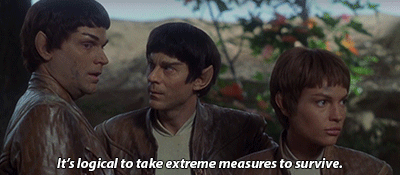
A Vulcan Mrs. Donner.
Stron is Vulcan-horrified at the idea of resorting to “savagery,” but thankfully T’Pol/T’Mir agrees to violate the Vulcan version of the Prime Directive instead so they don’t have to murder Bambi’s mom. But that scene raises an interesting point. Who was right, Mestral or Stron? Or both? Or neither?
Put 100 Vulcans in a room and ask them when war is justifiable, I’m sure they’d all spout off some Vulcan version of Just War Theory like the smug, walking information databases that they are. But put 100 Vulcans in charge of making a real-world decision about going to war, and we’d get 100 different answers, some which directly contradicted others, but each defended by iron clad logic.
To wrap this drivel up, Vulcan philosophy is a really bizarre hodgepodge of conflicting ideologies. They believe in infinite diversity in infinite combinations, which means they celebrate the beauty of the countless variables of the universe, unless it’s a Klingon bird-of-prey, in which case, they shoot that shit up. Pacifism is great when it’s convenient, killing is bad, except for when it isn’t, it’s not genocide if you have a really good reason, and eating animals is wrong, except for when it’s necessary. Yeah, logical.
I’m of the opinion that Vulcans are no better than humans—they do their best to grapple with complex issues according to a chaotic and occasionally contradictory set of beliefs. Even if they swear they aren’t driven by emotion, they are still at the mercy of their life experiences and world views when it comes to decision making. Logic is a tool that can help them arrive at answers, but it isn’t the answer. Most importantly, like any tool, logic can be abused or corrupted.
Given the weight of the evidence, I would re-assert that Vulcans are happy to declare anything as being logical, so long as it suits their agenda or personal beliefs. Or perhaps it’s better to say that the writers of Star Trek will call anything logical if it adds to the dialogue or advances the plot.
What say you, T’Pol?

#star trek#star trek discovery#star trek enterprise#star trek the original series#vulcans#vulcan philosophy#spock#t'pol#tuvok#meta#long post#live long and prosper
190 notes
·
View notes
Text
Kirk Prime grieving
If we ignore Star Trek: Generations. And if Jim outlived Bones as Spock did, there’s a good chance Jim was alive on the Enterprise E waiting in their shared quarters when Spock was taken into the anomaly. Beware, this post will squash your heart, put it together, and then tear it apart again.
He would have felt their bond severed because quantum mechanics. How painful it must have been for Jim. Imagine how heart broken he was. How soon do you think the grief would have overwhelmed him? He saw what happened through the window and he knows. Poor Jim is alone. Because everyone he knew is dead. Spock was the last one. Imagine Jim wavering through the stages of grief taking it pretty hard. Jim’s in denial that Spock is truly gone from his life. He packs what belongings they brought with them and notices their Enterprise crew family portrait is missing. He assumes Spock took it and that he is coming back soon. Spock knew he was going to die and took it with him because he rather not be alone because he discovered he has the onset of Bendii’s.. And Jim was right, he will die alone. Spock preferred not to bring Jim with him and wanted to be remembered the way Jim sees him now than a illogical,wasting irrational Vulcan. Spock wanted to spare Jim of seeing him fall apart.
Jim is approached by Picard who merely says, “I grieve with thee.” and Jim just has a forced smile thanking him for the comment. Jim thinks Spock could have survived. He could have survived. And he is hallucinating. The medical officer checks Jim over and recommends Jim goes to Vulcan to a healer to help him. Jim is approached by Geordi La Forge who knows how he feels about losing a loved one. Jim feels insulted because Geordi lost Data once not twice. Geordi mentions how they lost Data previously to a collector. Jim is dumbfounded. Geordi makes the point that Data came back just like Spock did and he is grateful for that, he also tells him that Spock would likely not want him to be going down that road. Geordi is right. Geordi asks if Jim still has some friends or family to be with him. Jim doesn’t feel appropriate to visit Peter Kirk’s family or Joanna’s grandchildren. He doesn’t feel himself at the moment to visit family. Jim sees Spock throughout the day and he has to remind himself that his Vulcan is gone. He then realizes he could have gone with Spock. He could have spared himself being alone. The Enterprise takes a few days to get to Vulcan. Jim gets a message from Deanna and Riker. He gets one from Alexander who is on another ship including a visit from Wesley.
Tryla Scott, a engineer, approaches Jim and tells him of how Uhura had raised her grandfather with Christine Chapel while being a product of Scotty and Uhura’s DNA. He grandmother raised her with some help from Scotty when she would not get her head out of hover cars while fixing them. Her father was a science officer. Tryla only knew Scotty for such a short period of time before he passed and offers her shoulder for him to cry on. She’s a commander by this point after her career was restarted for a fair chance at climbing the ladder due to the parasite’s involvement. Jim sees a lot of Uhura in Tryla and the twinkle in her eye that Scotty would have. Jim is thrilled to meet someone like her. He tells her stories of Scotty that he hadn’t written in his autobiography. Jim tells her some stories of Nyota Uhura’s time on the Enterprise. The embarrassing ones. They both share laughs at the humiliating Uhura stories. It helped them both with their still aching loss for their close friends. Tryla has to go on her shift and makes the wish that they had more time to talk with the sentence starter “If only. . .”
Jim wonders what would have happened if Spock got there in time. If the sun never went supernova. If Spock came back then everything would be okay. If the Vulcan managed to succeed. If he could go back in time and beam Spock out from his death. . . Jim then does research about the age of the planet’s sun to discover it was done by someone. It was set to supernova prematurely. Jim is outraged. He goes into a holodeck and sets up a room full of breakables. A replica of his quarters post the wrath of khan in San Francisco. He destroys everything. And he terminates the program with wet, teary red eyes and struggles to regain his composure. He goes past several ensigns, Klingons, who are going to have exercise in the holodeck. Jim visits the counselor of the USS Enterprise E. He needs someone to talk to. He drinks some hot chocolate and talks about how he is feeling lately. It’s a good session. Jim leaves the counselors office feeling better but depressed. He has had nightmares of different time where his father died heroically, growing up reckless and bold and his brother running away, and meeting Bones on a recruitment shuttle. And nearly losing Captain Pike to a mad Romulan. Spock and he not on good terms with a love-hate relationship. Spock, alive, alone---it’s his worst nightmare when he sees a dream of Spock in a cave during the ride to Vulcan. “James Tiberius Kirk, how did you find me?” with what relief was in his voice. That dream made him wake up crying. Jim’s certain its his mind plying tricks on him and that his wish for Spock to be alive is torturing him.
He is mellowing out and spends most of his time in the quarters with a headache. The headache is painful and it is hurting. It feels like someone yanked his entire being out. The noble, living organic half is gone. And all that is left is a vulnerable man with glasses and a big, kind helpful heart. Jim weathers it because he has gone through worse. He thinks of the Tarsus Nine and it makes him even more depressed because he is the only one left. Everyone he knew is gone, enemies, frenemies, old friends, and so on. Koloth is gone. Trelane is still around but he refers to himself as Q. Those Jim knew personally from his time are gone. The new people here make Jim feel like he doesn’t belong. Like he is a relic of a golden era. That is bygone. He expects Spock by his side and McCoy,too. It feels unreal not to have them. It makes Jim feel emotional how he is still alive when Spock was supposed to be the one who outlived the crew. Not Jim. When he’s alone on the way to the healer he talks to himself. It’s helpful for Jim to feel not alone and it comforts him that they are with him in some way. He sent his findings to Star Fleet with the entire report written in caps. He arrives to the healers place of work and he doesn’t look fine himself. The severed bond is repaired and his mental shields are put full throttle up. Jim leaves Vulcan and goes to Riverside to the old house. Sometimes he thinks he hears McCoy talking to him. The medicine Doctor Crusher had given him when he came to her ‘med bay’ is working with the hallucinations and they don’t continue as the severed bond condition has been taken care of. Jim’s nightmares get worse. Spock meeting Spock. Seeing his Spock looking down at the photograph. Awakening in the middle of the night from that image. He recalls a conversation he shared with McCoy when they were sitting back and relaxing on shore leave from a recent adventure on the USS Enterprise A contemplating a point made by one of the natives regarding how powerful of a force the triumvirate are. Largely considered a entity on the planet. “What are we, science or magic?” “A tragedy,darlin'.”
He has machines that take care of the house when he doesn’t feel like it. Jim eats less and does not go to town often. He is utterly depressed. And these nightmares are not helping. Jim sleeps in often and he attempts to make a new life without Spock. Somehow,four months later a stray cat sneaks into his house and curls up beside Jim on a empty bed. The cat makes Jim a lot better. He ends up adopting a lot of stray cats and taking care of them and ooops, he’s the neighborhood catman. McCoy would have been highly amused. Jim can hear his husbands comment on this in his mind. The kids on the farm come pouring in with rat problems and Jim happily gives away the kittens the cats make when they are old enough. Before Jim knows it, he has moved on and accepted that Spock’s gone now. Now all that is left is that one cat which entered his life. Christmas was a blurr to him and he doesn’t remember celebrating it nor Halloween or thanksgiving. Jim feels light on his feet and himself again with a cat perched on his shoulder when he goes to town. No one is surprised anymore with the cat that has no eyes. Jim calls the cat David. Jim, a retired admiral living off his pension, goes sailing with the cat to distract himself. The pain’s better now. Just a gentle ache in his heart. And goes out of his way to help people he comes across. The cat is usually on his shoulder. The cat is what wakes Jim up every morning and comes over to him to be petted when he is feeling sour/bitter/sad. It can sense these things. One day, David acts strangely in the morning. Jim lets him out and attends to house chores when he sees a familiar figure in the hall. He drops the empty mug. The machines clean the mess as Jim processes what he just saw. He admonishes himself for thinking who he thinks it is because they are dead and he is not. It breaks his heart to see a hallucination. Jim shoves down that heartbreak and vaporizes it internally. He gets another mug and makes himself coffee. He misses Spock and McCoy. He misses McCoy worrying about Jim and his health. Spock gently reassuring the doctor that he is fine even some reassurance from Jim himself. He misses hearing them and seeing them. He misses his crew. His sleeping habits have improved because of the cats and the nightmares are over.
Tryla gets a promotion to captaincy earlier so then she arrives to Riverside. She is excited to talk face to Face with her grandmother’s mother’s commanding officer because he feels like family and tell him the news rather than talk through messaging. Jim had been sending message after message to her regarding Scotty and Uhura that spills to stories about the core command crew. She could make a collection of stories or a documentary series with Jim as the talking head in them. She would rather make it when it feels appropriate. He had so much time on his hands. He did the recording in front of a aesthetically pleasing wall. He just sent her that morning a copy of the holovid he sent to Spock for becoming Ambassador because he ran out of stories to tell. She drives the hover-car rental to the Kirk residence. She get out then knocks on the door until she notices the door is unlocked. She calls Jim out as the camera goes through each room that is empty and intact. The kitchen,the living room, the dining room, the guest rooms, the closet,the bathrooms, as Star trek: TOS song plays gradually turning into the cinematic version of it, and the main bedroom with the bed made where above it is portraits of the crew. Tryla grows frantic searching for Jim until she gets to the backyard. Jim is lying by the garden motionless with his eyes open and wearing gloves with a garden shovel resembling Voyager in his right hand. It is even modeled and designed to be that way. Try attempts to resuscitate him and calls the authorities. Jim Kirk died alone. He is formally pronounced dead thirteen minutes later. Somewhere, far away,Spock just arrived into a alternate timeline with a severed bond. It is guaranteed with his ailment, he will not die alone.
The End.
#Kirk Prime#Spock Prime#old married spirk#James T. Kirk#Leonard McCoy#s'chn t'gai spock#star trek au#old married mcspirk#i couldn't help but add the quote#Kirk Prime feels#Star Trek: Alternate Original Series#Star Trek: The Next Generation#Star Trek: The Original Series
61 notes
·
View notes